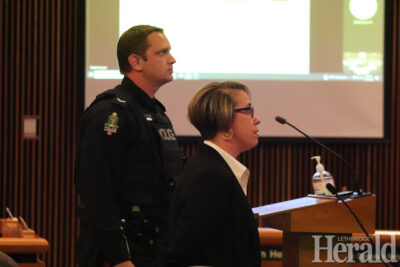Lethbridge police officers have completed new ethics training
By Alejandra Pulido-Guzman - Lethbridge Herald on December 7, 2022.
 Herald photo by Alejandra Pulido-Guzman
Constable Allister Koop and Victim Services program manager Catherine Pooley give a presentation during the most recent Lethbridge Police Commission meeting.
Herald photo by Alejandra Pulido-Guzman
Constable Allister Koop and Victim Services program manager Catherine Pooley give a presentation during the most recent Lethbridge Police Commission meeting.LETHBRIDGE HERALDapulido@lethbridgeherald.com
Members of the Lethbridge Police Service have engaged in new ethics training that has been completed based on a review done in 2019.
The new ethics training allows the LPS to become an ABLE (Active Bystandership for Law Enforcement) agency.
During the Lethbridge Police Commission meeting last week, LPS Constable Allister Koop explained the name by giving the definition of bystander which he said is being in a position to know and in a position to do something about it.
“That is the background. They call it passive bystanders to those who (don’t) do anything at all and let it happen, which is what we saw in George Floyd’s case. There were four officers who just let that happen. And there is the active bystander who we are saying you actually have to stop if it’s a negative behaviour,” said Koop.
To date all Community Peace Officers and 162 police officers have been trained.
Koop said that when they first started looking into this training, there was very limited information about mental health and policing. And about a third into the training they found a study done by the University of Regina where they asked over 5000 front line workers about mental health and they found “substantial proportions of participants reported” past year and lifetime suicidal ideation of 10.1 per cent, planning 4.1 per cent and attempts of 0.4 per cent.
Victim Services program manager Catherine Pooley who was also presenting, spoke about results in terms of the LPS.
She said that as instructors they looked at those statistics, but they did not just see numbers as a result of the study, they actually saw people.
“If the theory holds true in that study, then there is the potential for 17 people who have had those thoughts, we’ve got seven people who potentially have been planning and one that could’ve attempted. That’s assuming this study is correct, but those are real numbers, those are our people in our house and that really drove us to watch how we were teaching this course,” said Pooley.
She said that as instructors they worked really hard to create trust within the classroom and that resulted in a service-wide willingness to approach each other in a deeper way, foster authenticity from the members and an opportunity to continue the conversation, and respond accordingly to needs.
Koop said three main themes streamed from the ABLE training.
“Trust was an issue, because we were coming out of a time that I will call (a) polarizing time in LPS history. Media seemed to be hitting us, we kinda got hit from all sides, so trust was a big issue within our police department at the time and I can say since that, seems to be improving,” said Koop.
He said the second was that officers agree ABLE is the right direction for LPS, and the third was wellness is a priority.
“One of the things we heard over and over again is there is still a large stigma when it comes to mental health and frontline policing,” said Koop.
He said that based on that, wellness would become a priority.
During the presentation the next steps for ABLE training were mentioned, stating that as an ABLE agency they are committed to yearly two-hour recertification and refreshers for members, to be incorporated into use of force, firearms, report writing, traffic stops, pursuit training, instituting an ABLE awareness program, and adding an anti-retaliation policy and post-perception survey.
Follow @APulidoHerald on Twitter
19-18




